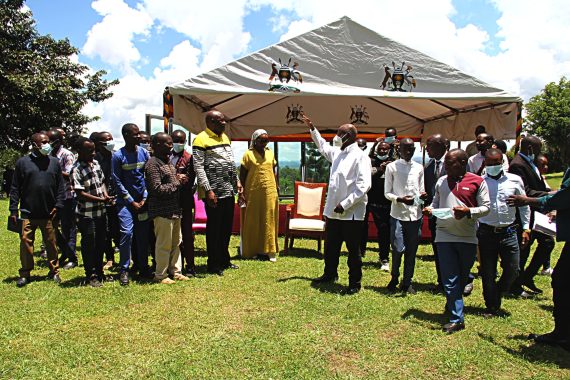Relatives and friends were left stranded at the Buganda Road Court on Tuesday morning as prison authorities refused to produce Deputy Lord Mayor Doreen Nyanjura, veteran politician Ingrid Turinawe, and two others.
The four women who are currently on remand failed to appear in Court on grounds that they refused to wear alternative clothes provided by the prison instead of allegedly provocative t-shirt’s they donned on following their arrest.
The accused were arrested on February 17 during protests demanding the release of Dr. Kizza Besigye and other political prisoners. At the time of their arrest, they wore T-shirts inscribed “Kill Me, Free Besigye”, a slogan authorities now seem determined to erase from public view.
The case, presided over by Senior Principal Grade One Magistrate Winnie Nankya Jatiko, was adjourned to March 10 after prisons informed the court that they could not present the accused in political T-shirts.
Defence lawyer Mugabi Cornely expressed frustration over what he called a new tactic by the state to suppress political activism.
“We came back today for the bail application of Nyanjura and others. The last time we were here, the state claimed they needed time to verify documents. Now, they have found a new way to keep them locked up,” Mugabi told journalists.
He questioned the legality of prisons dictating what detainees wear to court.
“It is not the first time politicians, activists, and others have been arrested. The clothes you are arrested in are the same ones you wear to court. While inside prison, we understand they must wear the yellow uniform, but in transit and in court, inmates always get back their own clothes. Why is this case different?” he asked.
Mugabi also raised concerns over the magistrate’s conduct, arguing that the court was proceeding on “informal” information rather than an official explanation from prisons.
“Normally, if inmates are not brought to court, the prison’s officer at court must explain. Today, there was none. Instead, the magistrate simply said she was ‘informally informed’,which is absurd. Court cannot proceed on hearsay,” he protested.
He warned that if this issue is not resolved, Nyanjura and the others may still be absent on March 10, raising the question: What happens if they still have only these T-shirts? Will prisons continue to defy court orders?
Kira Municipality MP Ibrahim Ssemujju Nganda lashed out at both the prisons authority and the magistrate, calling the move “a circus and political persecution.”
“First of all, as an MP, we allocate a budget to prisons for feeding inmates and transporting them to court. We do not give them money to enforce a dress code. Between court and prison, someone has lost their mind,” Ssemujju fired.
He accused prisons of “playing games” and questioned why wearing a T-shirt with Besigye’s name had suddenly become a crime.
“I have been in prison myself. When you are arrested, you wear their uniform inside, but when you are coming to court, you return to your own clothes. Why is it now illegal for them to appear in court wearing the same clothes they were arrested in?” he asked.
Ssemujju also took a swipe at Magistrate Nankya Jatiko, accusing her of turning the court into personal property and making politically motivated decisions.
“This magistrate needs to be reminded that she is paid by taxpayers to serve justice, not to take orders from above. Since when did court sessions become about regulating dress codes? Does she think this court belongs to her?” he fumed.
Other opposition figures also weighed in, condemning what they termed political interference in judicial processes.
“Today, we witnessed political prostitution at the Uganda Road Court. Instead of delivering justice, the magistrate focused on petty issues like dress code,” one activist remarked.
They accused the state of deliberately weaponizing legal loopholes to keep opposition figures locked up without trial.
“Justice delayed is justice denied. We demand that our comrades be brought to court immediately so they can get justice,” they declared.
The accused face charges of being a public nuisance contrary to section 65 (e) of the Road Act.










